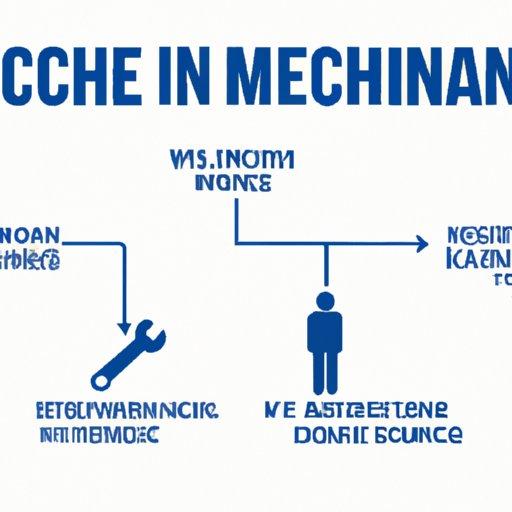
I. Introduction
When it comes to choosing a career path, becoming a mechanic can be a valuable option for those who love working with their hands and have a passion for cars. Not only do mechanics get to work with their favorite vehicles, but the field also offers excellent job security — as long as there are cars on the road, someone will need to fix them. If you’re interested in becoming a mechanic, this guide will walk you through the steps you’ll need to take along the way.
II. How to Become a Mechanic: A Step-by-Step Guide for Beginners
For those who have absolutely no experience in the field, the first step to becoming a mechanic is to start learning. This can involve anything from reading up on cars and their internal workings, to watching instructional videos online, to simply tinkering with your own car and seeing what you can fix.
Once you feel like you have a basic grasp of what you’re doing, it’s time to start getting more formal training. One option is to enroll in a vocational or technical program that specializes in auto repair. These programs can range from a few months to a few years, so it’s important to do your research and find one that fits your goals.
In addition to formal education, it’s also important to get as much hands-on experience as possible while you’re learning. This can involve everything from working on friends’ cars to volunteering at a local repair shop. The more you can practice your skills, the more valuable you’ll be as a job candidate down the line.
When you’re just starting out in the field, some common entry-level jobs might include:
- Oil change specialist
- Tire technician
- Entry-level mechanic
- Service advisor
III. The Skills and Education Needed to Become a Successful Mechanic
While there are some mechanics who are completely self-taught, having a formal education in the field can give you a leg up when it comes to finding jobs and advancing your career. The courses you take might include everything from engine repair to welding to electrical systems to diagnostic skills.
Core skills that are important for anyone looking to become a successful mechanic include:
- Hands-on ability and a good sense of spatial reasoning
- Ability to troubleshoot problems and come up with solutions
- Strong communication skills
- Detail-oriented mindset
It’s also important to stay up-to-date with industry changes, whether that means attending workshops and conferences or keeping up with industry journals and online forums.
IV. Breaking Down the Road to Becoming a Mechanic
One of the biggest obstacles that aspiring mechanics might face is the licensing process. While not all states require mechanics to hold licenses, many do, and even in those that don’t, having a license can make you more marketable to potential employers. The licensing process typically involves completing an exam, which can include both written and hands-on components.
Another challenge can be the physical demands of the job. Mechanics often spend long hours on their feet and have to be able to lift heavy equipment without injuring themselves. It’s important to be aware of these demands and to work on developing habits that can help you stay healthy and injury-free.
Finally, competition in the field can be high. In order to distinguish yourself from other job candidates, it’s important to focus on building your skills and your resume. This might involve volunteering at a local repair shop, attending industry events, or even starting your own side projects.
V. Secrets to Successfully Launching a Career as a Mechanic
If you want to truly stand out in the job search process, there are a few things you can do to bolster your chances:
- Build a strong resume by highlighting your relevant experience and skills
- Be prepared to answer common interview questions about your experience and approach to problem-solving
- Show your dedication to the field by staying up-to-date with industry changes and attending conferences and events whenever possible
- Avoid common mistakes like failing to dress professionally or being late to interviews
VI. From Hobbyist to Professional: Tips for Transitioning into a Mechanic Career
If you’re someone who already has some experience working on cars as a hobby, transitioning into a professional mechanic role might be easier than you think. However, it’s important to keep in mind that there is still plenty to learn, and you’ll need to be able to work within a professional environment as well as on your own.
Additional training you might want to consider includes advanced courses in areas like welding and engine tuning, as well as certifications in specific areas like brake repair or electrical systems.
Networking is also important when it comes to transitioning into a career as a mechanic. Attend industry events, get involved in online forums, and try to connect with other professionals in your area. The more people who know you and your skills, the more likely you are to find job opportunities.
Successful mechanics also tend to have some key habits in common. These might include keeping their work area clean and organized, being able to work effectively under pressure, and maintaining a positive attitude even in the face of challenging repairs.
VII. Conclusion
By following the steps laid out in this guide, you’ll be on your way to becoming a successful mechanic in no time. Whether you’re starting from scratch or building on existing skills, remember to stay focused, stay motivated, and never stop learning. With the right combination of education, experience, and dedication, you’ll be able to build a fulfilling and rewarding career in this field.




